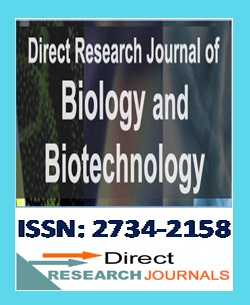Comparative Evaluation of Anti-malarial activities of Methanol Leaf Extracts of Dialium guineense and Morinda lucida in Plasmodium berghei – Infected Mice
Keywords:
Anti-malarial, Dialium guineense, Morinda lucida, Plasmodium berghei, leaf extracts, infected miceAbstract
Malaria, a serious global health issue, has become increasingly difficult to treat due to drug resistance. As a result, researchers are focusing on finding new treatments, including those derived from medicinal plants. The pathogenesis of malaria involves significant changes in hematological and biochemical parameters. This study aims to compare the effectiveness of methanol leaf extracts from Dialium guineense and Morinda lucida in treating malaria in mice infected with Plasmodium berghei. The methanol leaf extracts were subjected to Gas Chromatography and Mass Spectrometry for the determination of bioactive compounds. Different doses of the extracts and Artesunate (20 mg/kg) were administered orally to the infected mice for five days, thereafter parasitaemia was monitored. The livers were collected for weighing and histological studies. The GC-MS results indicated the presence of large quantities of alpha tocopherol, squalene, linolenic acid and moderate levels of lupeol and other pharmacologically active compounds. At P< 0.05, there was significant suppression of parasitaemia in the groups of mice infected and treated with rated doses of the extracts and Artesunate. The infection induced significant hepatomegaly in the infected and untreated animals which were significantly ameliorated in the groups of infected mice treated with the rated doses of the extracts and Artesunate. Both extracts were effective in protecting against hepatomegaly and severe lesions in the histoarchitecture; validating their experiential use as remedies for malaria. However, when compared with the infected and untreated groups, the methanol leaf extract of M. lucida had a greater preventive effect in this study.







